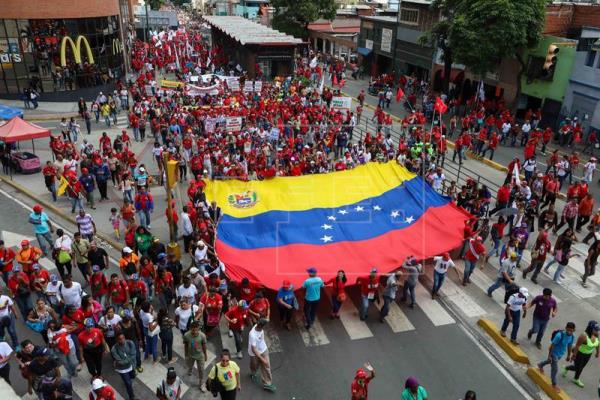Thousands of Venezuelans have marched through Caracas on World Youth Day, an important annual event in the Latin American country, in support of President Nicolas Maduro.
The Chavistas – named after Hugo Chavez, a figure of the Latin American left and the late predecessor of Maduro – marched some 14 kilometers (nine miles) through the streets of the capital on Saturday, beating drums and waving flags of Venezuela.
“Chavez sets the tone, Maduro is behind the wheel,” read one banner.
The government had mobilized its party and chartered buses to bring in supporters of all ages from all over the country for the rally held on World Youth Day.
President Maduro, speaking at the end of the World Youth Day program, said, “We are going to rebuild our homeland Venezuela; its economy, culture, and the national spirit… I ask you (the youth) to help me… revolutionize whatever needs to be changed. I have come to ask you for help.”
The president also asked young Venezuelans to educate themselves ethically and politically with “the values of Bolivarianism, Chavism” and to help him fight corruption and bureaucracy.
Maduro again condemned the international sanctions imposed on Venezuela, stressing that young Venezuelans were the most affected by the sanctions, especially during the COVID-10 pandemic. “Better days are coming,” he said.
Venezuelan opposition parties on Saturday also staged a demonstration, led by Juan Guaidó, the former Western-backed president of the country’s National Assembly.
Read More: How the 1979 revolution freed Iran from great power tutelage
Guaidó urged the people who gathered in Caracas to unify and push for an early presidential election ahead of the currently scheduled vote in 2024. He called unity a “key pillar” for victory.
“We are going to return… to the place where freedoms are exercised: the street,” Guaidó said in the demonstration with less than 500 people participating. He promised to revive the street protests that rocked the government in 2019 but eventually died out.
Venezuela plunged into political turmoil after Guaidó, the United States-sponsored opposition figure, unilaterally declared himself “interim president” in January 2019. He later launched a botched coup to oust Maduro with Washington’s greenlight and help from a group of rogue soldiers.
Maduro’s re-election in 2018 in a vote boycotted by the opposition is not recognized by the United States and its allies.
The US has imposed several rounds of tough sanctions against Venezuela aimed at ousting Maduro and replacing him with Guaidó. The sanctions, which include the illegal confiscation of Venezuelan assets abroad and an economic blockade, have caused poverty, a lack of access to basic goods, gasoline shortages, and power cuts.
Some Venezuelans have even moved to other countries to avoid the dire economic situation, including some two million people who now reside in Colombia.













